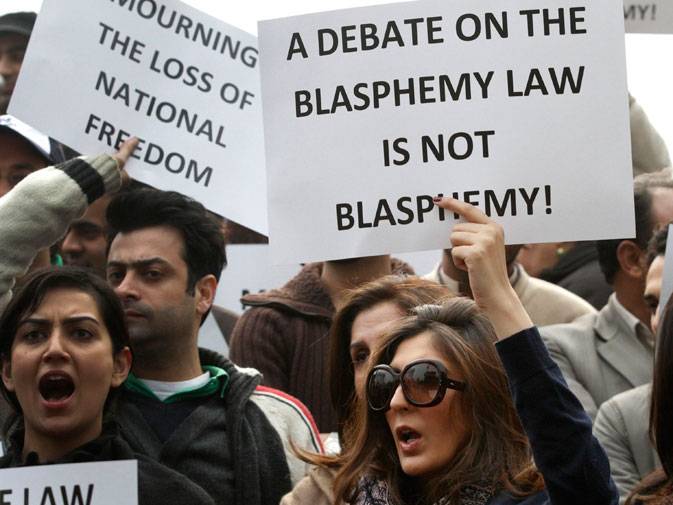Blasphemy is the act of insulting, showing contempt or lack of reverence for God or that which is considered sacred. In 1987, General Zia-ul-Haq ‘Islamised’ the blasphemy laws as part of a widespread policy of Islamisation. The blasphemy laws are now enshrined in section 295 A, B and C of the Pakistan Penal Code, with their focus being on protecting Islam.
Presently, Pakistan uses this controversial law at a level unparalleled to anything anywhere else in the world. The law has had a disproportionate impact on minority communities. There have been 702 cases registered against minorities, which equates to 52% of total cases against 4% of the population of Pakistan. The laws are routinely used to target religious minorities for personal or political motives, and result in a violation of fundamental rights. This is evident in the cases of Aasia Bibi and Rimsh aMasih. Blasphemy laws and this treatment of minorities are contrary to rights guaranteed in Pakistan’s constitution, particularly the right to profess religion (Article 20), equality of citizens (Article 25) and protection of minorities (Article 36).
In the following lines we shall analyze this blasphemy law in the eyes of famous jurists of Sunni school of thought.
Most of the people living In Pakistan follow the Hanafi Jurisprudence of Sunni Islam. This means that most of the people follow the teachings of Imam Abu Hanifa (one of the four imams of Sunni school of thought).
According to most of the Hanafi jurists, if any Muslim insults God (Allah), or insults Prophet Muhammad, or insults Quran, then he ceases to exist as a Muslim (apostasy). Since the punishment for apostasy in Islam is death, therefore any Muslim who commits such acts must be killed (since after committing these acts he or she no longer stays as Muslim).
Now in the light of these jurists, one thing is crystal clear: if the blasphemy law was based on the teachings of these jurists of Hanafi school of thought, then it would not have been applicable on non-Muslims. Its implementation would have been only on Muslims. Imam Abu Hanifa in this regard says:
“Imam Abu Hanifa said that a non-Muslim will not be killed on the basis of Shatam e Rasool (Blasphemy against Prophet Muhammad). The Shirk that he is already committing (being a non-Muslim) is a much bigger crime (and we don’t kill him for that).”
This was also narrated by Imam Khatabi in his book Ma’alim al-sanan’alasunan Abi Dawud.
Deoband and Barelvi sects are the most followed sects of Hanafi school of thought in the Sub-Continent. The founders of Deoband Movement (Rashid Ahmed Gangohi, Maulana Mahmood Ul Hassan) and the Barelvi Movement (Ahmed Raza Khan Barelvi) all agreed on one thing, that a non-Muslim cannot be killed on committing the act of blasphemy. This law is only applicable on Muslims.
Moreover, Maulana Syed Abul Ala Maududi, the most influential Scholar of the 21st century and the founder of Jamaat-e-Islami, the largest Islamic party in Pakistan, was also of the view that a non-Muslim cannot be killed on the act of blasphemy.

The rights of dhimmi (non-Muslims) living in a Muslim state include protection of his life even in instances of blasphemy as per Maulana Maududi.
From the above discussion, it is quite evident that the blasphemy law in Pakistan is against the Hanafi jurisprudence of Sunni Islam.
On January 4, 2011, Salmaan Taseer, the then governor of Punjab was assassinated for speaking against this blasphemy law, which is based on nothing but lies and emotions. His family still awaits Justice.
On March 2, 2011, Shahbaz Bhatti, the then federal minister for minorities affairs and a Christian-critic of the blasphemy law in Pakistan was also assassinated.
Pakistan is amongst the most dangerous countries for the minorities and one of the top countries with increase in threats to minorities since 2007. The fundamental rights of minority communities are frequently violated, with a major cause being blasphemy accusations and the violence that surrounds them.
The law continues to perpetuate an environment of intolerance and discrimination. To guarantee equal treatment and fundamental rights to minorities in Pakistan, an attempt to reform the blasphemy laws must be made. Without this, the state will never be able to achieve peace, tolerance and equal human rights.






